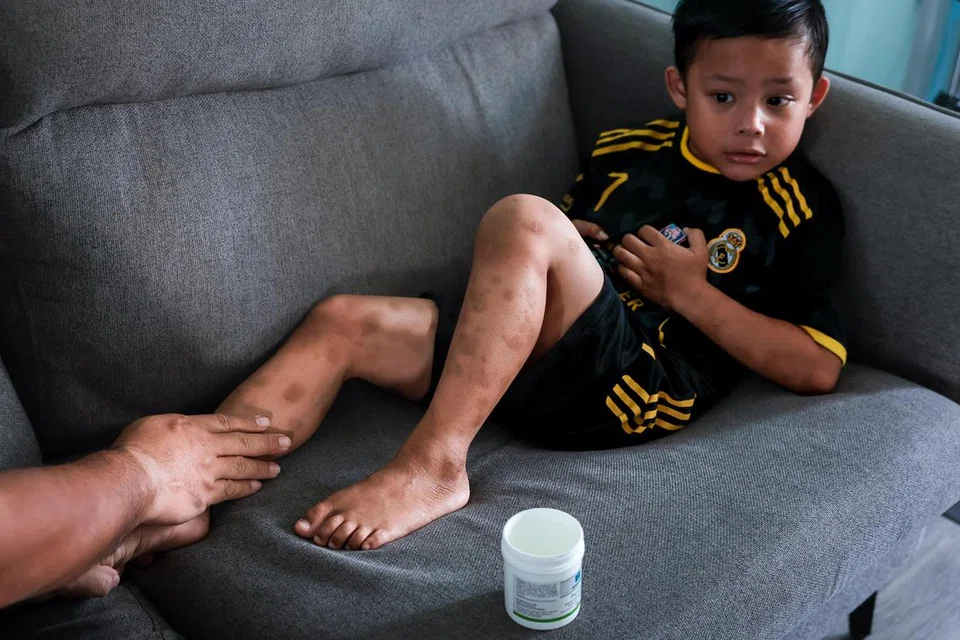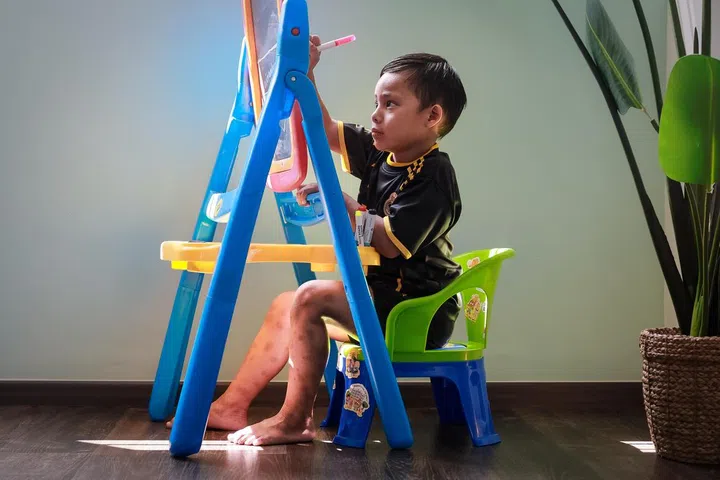Singapore seeing more cases of moderate to severe eczema

SINGAPORE – The prevalence of eczema in Singapore has been largely stable in the past decade, affecting about one in five children and one in 10 adults. But the number of people stricken with moderate to severe forms of the disease – with skin that may ooze fluid, crust or bleed – appears to be rising.
Both KK Women’s and Children’s Hospital (KKH) and National Skin Centre (NSC) said there are more patients with moderate to severe atopic eczema, though the numbers are not clear as no recent studies have been done.
Atopic eczema, or atopic dermatitis, is the most common type of eczema. Nobody is born with it – it typically starts after a few weeks or months of life.
KKH, which handles about 20 new atopic eczema cases a day, is seeing more children with moderate and severe forms of the disease, and these children make up about 20 per cent to 30 per cent of eczema patients, said Associate Professor Mark Koh, head and senior consultant at the hospital’s dermatology department.
At NSC, Dr Yew Yik Weng, a senior consultant dermatologist and consultant-in-charge of the Eczema Clinic, said the number of eczema cases at the centre has remained largely steady but the number of moderate to severe eczema cases could have risen slightly.
It handled more than 14,000 new eczema cases in the year ended March 31, 2023.
From various epidemiology studies NSC has performed, moderate and severe cases made up about 25 per cent of all eczema cases, of which 15 per cent are moderate and 10 per cent are severe, added Dr Yew.

By signing up, I accept SPH Media's Terms & Conditions and Privacy Policy as amended from time to time.
The doctors said genetics, and Singapore’s heat and humidity, are the likeliest causes of eczema here.
“Dust mite allergy also contributes significantly. Dust mites thrive in humid environments. In general, heat, sweat and dust make up the most common triggers and aggravating factors of eczema in Singapore,” said Dr Yew.
Besides environmental factors, moderate to severe cases could be attributed to immune dysregulation in these patients, he added.
KKH’s Prof Koh said stress is another important cause of atopic eczema flare-ups, and the incidence of atopic eczema increases in higher socio-economic communities, although the exact reasons for this are unclear.
He added that most patients have a genetic predisposition, with other family members also having atopic dermatitis or other atopic conditions such as allergic rhinitis (sinus), asthma and allergic conjunctivitis.
“If one parent has an atopic condition, each child has a 40 per cent to 50 per cent risk of getting AD (atopic dermatitis); if both parents have atopic conditions, each child will have a 70 per cent to 80 per cent risk of getting AD,” he said.
“Mutations in the filaggrin gene (an important gene involved in skin barrier function) have been found in some but not all patients with AD, but there are other genetic causes that have not been explained clearly.”
New treatments work, but they are costly
Prof Koh said that without an appropriate long-term option to tackle eczema symptoms, patients can get caught in a continuous cycle of frequent, unpredictable flare-ups and unsightly lesions, along with persistent itching, pain and inflammation.
Until dupilumab, which belongs to a new class of biologic drugs and is sold under the brand name Dupixent, emerged a few years ago, there were limited treatment options for moderate to severe atopic eczema.
Lifestyle modifications, avoiding triggers, topical steroids and the use of moisturisers are among the treatments for those with mild and moderate cases. However, patients with moderate to severe forms may require phototherapy, oral immunosuppressants, dupilumab, or a newer class of drugs known as JAK (Janus Kinase) inhibitors.
Dupilumab, the world’s first biologic approved for the treatment of moderate to severe atopic dermatitis, is the only such therapy approved in Singapore.
Dr Yew said that there is a significant reduction in itch with the use of dupilumab, followed by an improvement in skin rashes within a period of as short as two weeks for 25 per cent of individuals.
At KKH, Prof Koh said that for patients treated with dupilumab, there is a 95 per cent to 97 per cent success rate, with most patients achieving at least 75 per cent to 90 per cent improvement after six to 12 months of treatment.
About 50 per cent of patients can achieve more than 90 per cent improvement. After good control, the frequency of injections may be reduced and some patients can wean themselves off the medication after a few years of treatment.
However, dupilumab costs around $1,000 per dose and is recommended to be given to adults every fortnight.
The prices of JAK inhibitors range from $400 to $1,200 per month, depending on the dosage and type given. Regular monitoring is needed and that can add to the costs.
For instance, one type of JAK inhibitor, the abrocitinib tablet, licensed for use in individuals aged 12 years and above, costs about $736 for a 28-day course, said Prof Koh. Eligible patients may receive government subsidies ranging from 20 per cent to 75 per cent.
With the better efficacy and safety profile of biologics and JAK inhibitors, more patients, especially children and adolescents, are shifting away from using systemic immunosuppressants, which can be associated with more long-term side effects, such as kidney, liver and blood disorders, cancers and chronic infections, he added.
KKH has so far treated more than 250 children and adolescents with dupilumab. One of them, five-year-old Faris Zafran, was recommended Dupixent when he was in hospital for a bad eczema flare-up, with pus oozing from wounds on his leg.

With help from KKH funding and insurance monies, he now receives the treatment once every six weeks. He also has moisturisers and steroid creams applied on certain areas of his body.
His mother, operations specialist Syidatulindah Baharom, 41, said she first started Faris on topical steroid creams and moisturisers, as well as wet wrap therapy. However, he would suffer another flare-up before long, she said.
Ms Syidatulindah has had whole-body eczema since she was a teenager, and found that the same drug is effective, but she had to stop using it because she could not afford it. She now depends on steroid cream, tablets and moisturisers.
In Parliament on Nov 12, MacPherson MP Tin Pei Ling filed an adjournment motion on the need to recognise eczema as a chronic disease so that individuals with moderate to severe eczema who require effective but costly treatments can get the support they need.
Her suggestions included adding dupilumab and other biologics to the list of subsidised drugs and for moderate to severe eczema to be added to the Chronic Disease Management Programme (CDMP) so that patients can use up to $700 of their MediSave a year.
In response, Senior Minister of State for Health Janil Puthucheary said the Clinical Advisory Committee had in 2020 decided not to include eczema under the CDMP as care practices for eczema currently vary significantly and there are no standardised national guidelines for the treatment of eczema.
The Agency for Care Effectiveness at the Ministry of Health is developing clinical guidelines for the treatment of atopic dermatitis. Once the guidelines have been established, the committee will review if eczema can be included in the CDMP, he added.
He also said that dupilumab, an injectable, was not recommended for subsidy, as its benefits do not justify its costs, at the current price proposed by the manufacturer.
Join ST's WhatsApp Channel and get the latest news and must-reads.







No comments:
Post a Comment